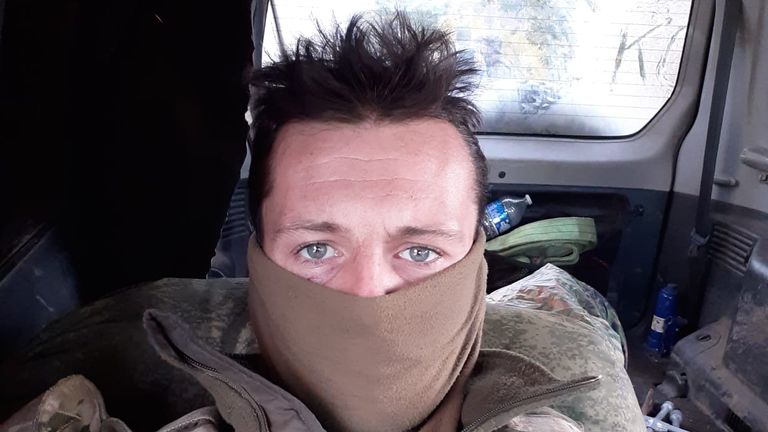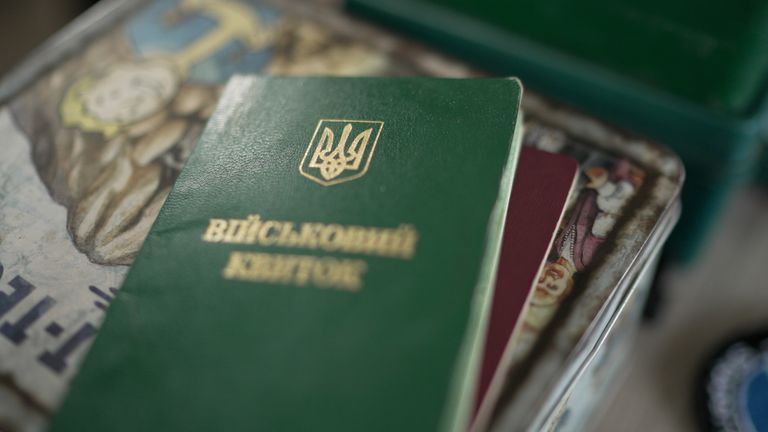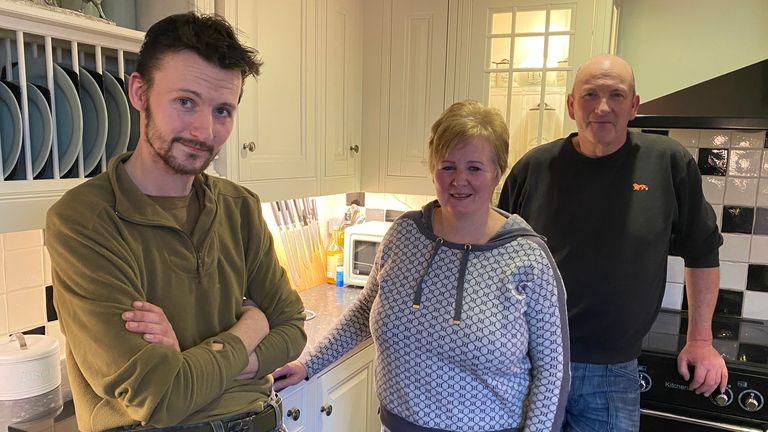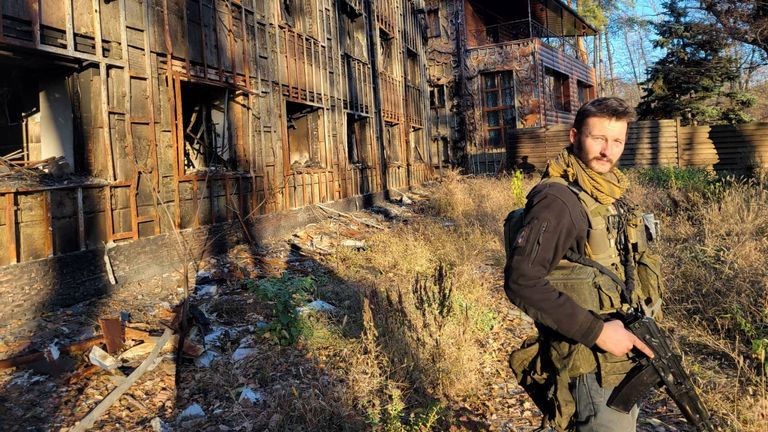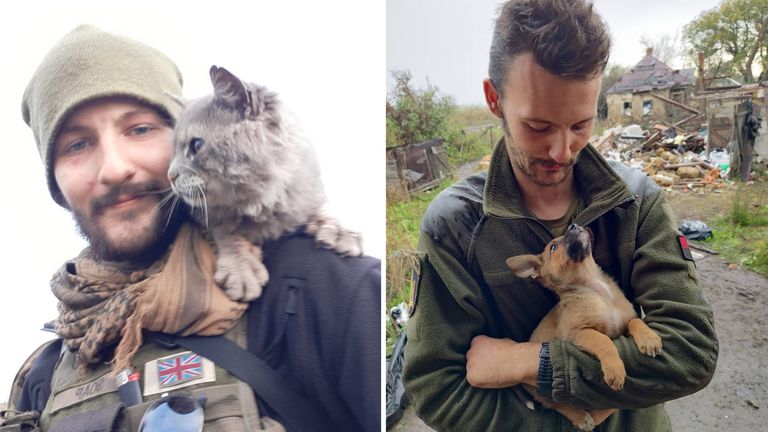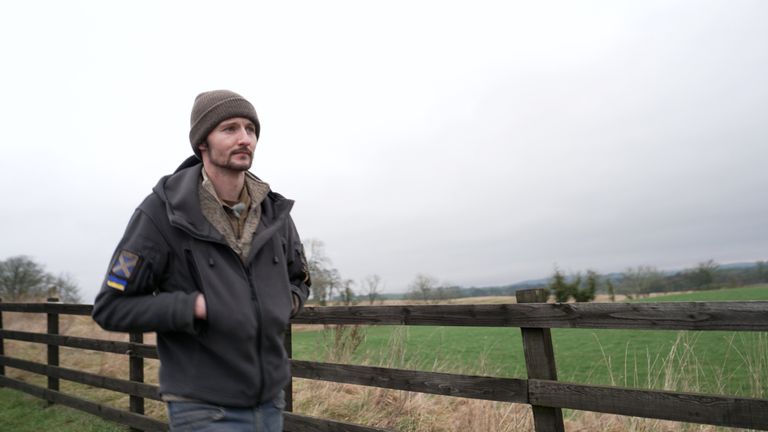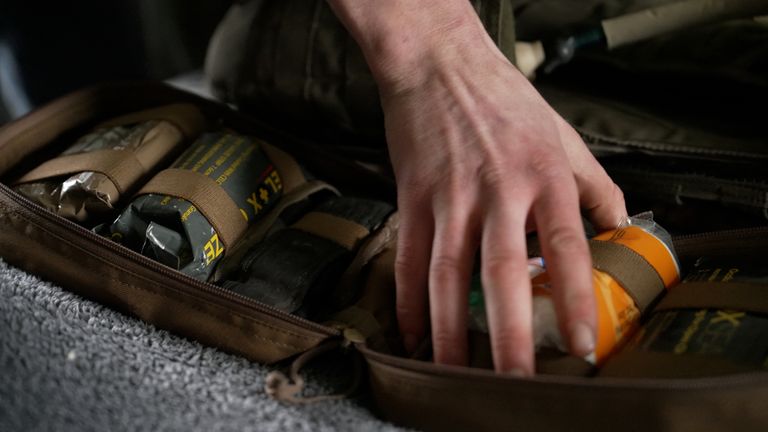'I turned off Netflix and went to fight': The Scot who went to war in Ukraine
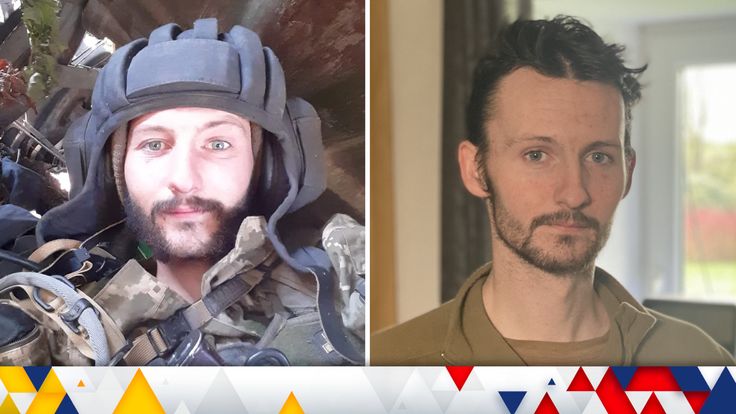
Saturday 25 February 2023 14:48, UK
"The helicopters were the worst," Douglas says, looking out across the field where he played soldiers as a kid.
"It would get louder and louder then you'd hear the duh duh de duh."
That sound is seared into Douglas's memory - the noise of incoming fire from an enemy helicopter overhead.
The 26-year-old recently returned from the frontline in eastern Ukraine and the sound of low-flying aircraft over his family farm in southwest Scotland still makes him run for cover.
Early in the war, President Volodymyr Zelenskyy called for volunteers to join the fight to defend Ukraine. Douglas, who fixes tractors for a living, first started thinking about joining their ranks on a cold, dark March evening last year.
Read more:
'They took turns raping me'
How has Russia's economy weathered the West's sanctions
From Paddington to president - how Zelenskyy became a war leader
He was lying on the sofa after work, beer in hand, flicking through Netflix. It was the first few weeks of Putin's invasion and he couldn't get the idea of war in Europe out of his head.
Normally, he ignored the news but with the invasion leading every bulletin he kept turning up the volume on the radio in the workshop to listen. The idea of going to Ukraine nagged away at Douglas as he went back to work on another vehicle.
The next day he asked Spotify to shuffle his songs - it played Seven Nation Army by The White Stripes. He took it as a sign. Despite not having any military training or experience, he had to go. He quit his job that day.
His parents pleaded with him not to go
Douglas wasn't alone. The Ukrainian government estimates that 20,000 overseas volunteers signed up in those early days.
His father, Derek, who looks after the family farm, and his mother, Sheena, who runs a catering company, pleaded with him not to do it.
"When he came and said he was going it was very tough," she says.
During his first month in Ukraine, he helped with international aid efforts - packing food parcels, sending kit to the frontline. Then came the opportunity to join the fight.
Douglas signed up to a nationalist Ukrainian battalion called Carpathian Sich, whose numbers were bolstered by overseas fighters. For his callsign - a nickname that is used during military operations - Douglas chose "Soap" after a tough Scottish character in the Call Of Duty video game.
He found himself fighting alongside men from Japan, China, North and South America, as well as fellow Europeans. Their reasons for joining ranged from rekindling military careers, to escaping troubled home lives. Some just wanted to stream their war on TikTok, while others considered themselves elite soldiers who would never share their activities.
His modest military salary kept him afloat. "We got paid, which was a big relief," he says. "We spent a lot getting out there, feeding ourselves, keeping ourselves supplied up, and paying bills at home."
There were plenty of surreal moments, like spending his 26th birthday in a trench being attacked by the Russians. Meanwhile, his family were back home waiting anxiously for news.
"The way I dealt with it was to put a barrier up and expect a phone call," says Derek.
Thankfully, that call never came.
Home in time for Christmas
For Sheena, it was a "nightmare". She coped by switching off news updates about the war and throwing herself into her work. She's still upset that Douglas didn't message them more often.
After eight months, Douglas made it home in time for Christmas. Sitting at the breakfast bar in the farmhouse kitchen his family's relief at having him home safe is clear.
"We're lucky we've got Douglas back," Derek says. "But in Ukraine, there's a lot of people that won't be coming back."
Back outside on the farm, Douglas says that even though it was hard, and he lost friends in the fighting, he still cherishes the memory of watching as Ukrainians returned to the villages he'd helped liberate. "To just see that, made everything worthwhile," he says.
But the relentless physical demands, and a close encounter with a tank that left him with concussion, gave his fellow soldiers cause to worry about him. One day, last autumn they took him aside and said bluntly "go home Soap". He knew he couldn't take much more - so he walked off the battlefield.
'You only get so many close calls'
Before returning to the UK he tracked down several of his injured friends from the trenches who were being treated in Ukrainian hospital beds. He wanted them to know they were not alone.
Settling back into normal life has been complicated. He's struggled with his sleep and has just landed a new job. But he's not sure if his war is over.
"That's the dilemma," Douglas says, showing us the kitbag that's packed and ready to go in his bedroom. "I think I could do more good, whether it is humanitarian work or fighting, but you only get so many close calls."
His parents would really struggle if he chose to return. A "suicide mission" is how his dad describes it. But for Douglas, his time in Ukraine has proved formative.
Click to subscribe to Beth Rigby Interviews… wherever you get your podcasts
Read more:
Criticism of war spreads on Russian social media
On the frontline of the fight against Russia
Who is hosting Eurovision this year?
"It's given a lot to my life," he says.
"Just to understand what we have... freedom and the fact we get to live."

